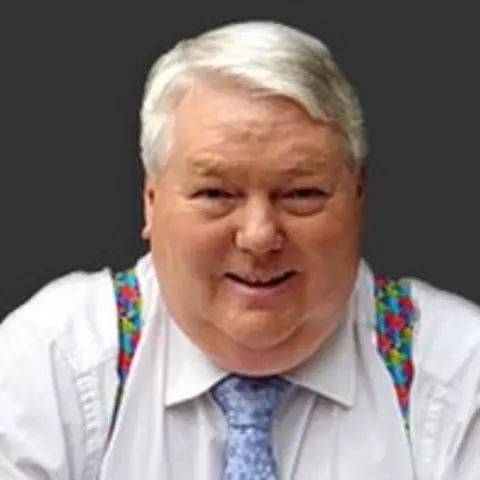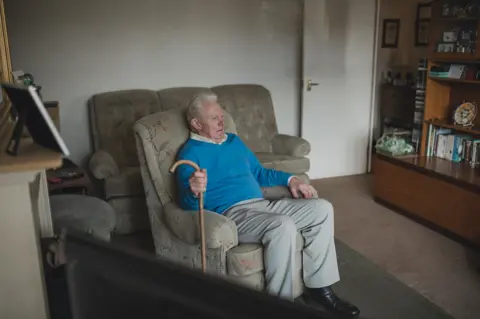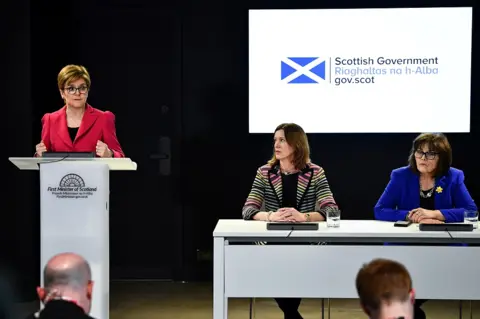Coronavirus: Empathy during 'monumentally difficult' crisis

 Getty Images
Getty ImagesAnd so it seems that Scotland's septuagenarians and older, sprightly or otherwise, will not be asked to isolate themselves entirely for fear of coronavirus.
They will be asked instead to reduce substantially their social contact. For some, sadly, that will not be a particular challenge - as their circle of friends and visiting family may already be rather reduced.
For others, however, it will present a dilemma. Are they to abandon their regular visits to, for example, church or Zumba?
I would not care to be the person in authority charged with persuading some of our more feisty pensioners to return home and lock the door.
Over the weekend, there appeared to be a degree of confusion. With regard to the situation in England, the UK government seemed to be suggesting complete isolation.
In Scotland, the position was always more modified. It was suggested from the outset that those aged over 70 might be asked to cut down their social interaction, in their own interests. The objective being to protect the most vulnerable.
Grant Shapps, the UK transport minister, has now modified his government's advice somewhat. Questioned on the wireless, he said the aim was still self-isolation - but the over 70s would be able to go for a walk. It was, he averred, about being sensible and not mixing in crowds.
Not, all in all, particularly helpful to our more mature citizens. Do they go to bridge class or pass? Or the pub for a game of dominoes? Or their chosen place of worship?
To be clear, I understand. I sympathise. The overwhelming, overawing nature of this crisis is bound to generate a degree of uncertainty in officialdom.
If anything, perhaps the authorities in Scotland have appeared a little more sure-footed. Dr Catherine Calderwood and Professor Jason Leitch have been excellent: clear and straightforward in their advice which, thankfully, is delivered in fluent human.
I particularly liked Jason Leitch explaining why we shouldn't hoard hand sanitisers. He pointed out that it would achieve little if we cleared the shelves, leaving our neighbours bereft - and thus more likely to spread the disease to us.
Nicola Sturgeon, too, has seemed swift and assured; for example, deftly prefiguring the collective announcement on on mass gatherings.
 Reuters
ReutersBut, again, I empathise with anyone who has stumbled a little in this crisis. It is monumentally difficult.
Further, the responses which can be offered are, inevitably, limited and simplistic. Little wonder that there can be a quandary in issuing guidance.
Consider. There is presently no cure. No vaccine. No scientific solution, either medical or technological. Nothing smart in this world where we have become inured to expecting slick, packaged answers.
In the face of this calamity, we are reduced to washing our hands as frequently and vigorously as Lady Macbeth - while avoiding large groups of our fellow citizens.
In essence, the hope is that the virus will spread, but slowly and steadily, exhausting its hideous, mortal virulence as it passes from one to another.
Inevitably, in Scotland, slightly dark humour emerges. One says: "So they've banned gatherings of more than 500. Luckily, that exempts most of Scottish football."
Another, considering the run on toilet tissue, says: "Thank goodness for newspapers. Just try wiping your backside on a website."
But folk are scared. Really scared. Scared for their health. Scared for their families. Scared for their children's schools and exams. Scared for their jobs. Scared for small companies struggling to cope.
Occasionally, when we contemplate the cosmos, we are reminded how small is our stake in the infinite universe.
With this crisis, we are reminded that we are relatively weak, vulnerable animals. But creatures with intellect - and hence collective strength through common endeavour.
In searching to promote that common endeavour, it is to be expected that there will be some awkward steps. We understand.
